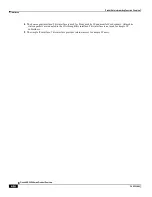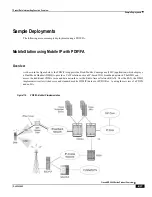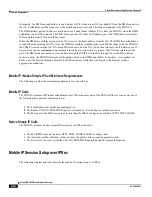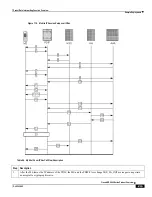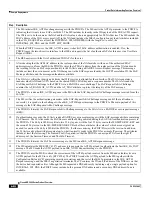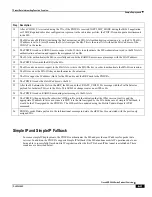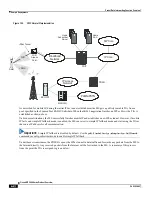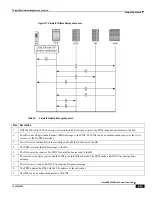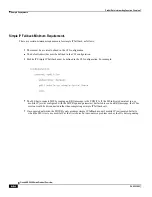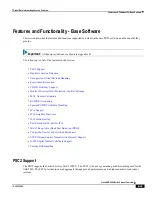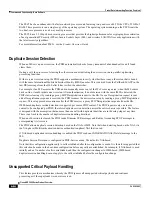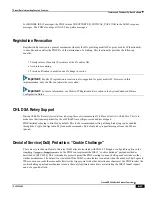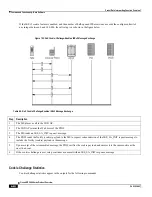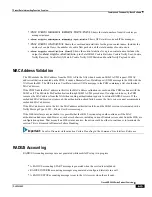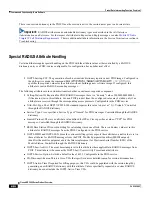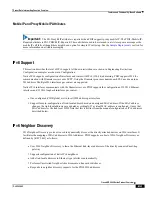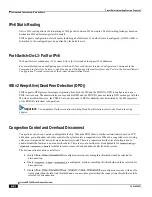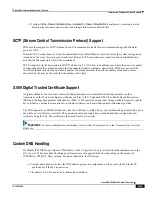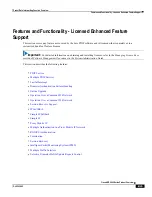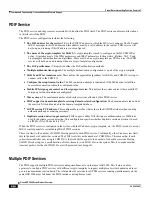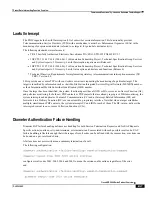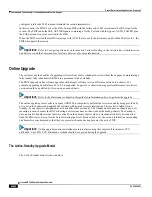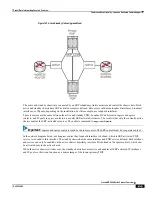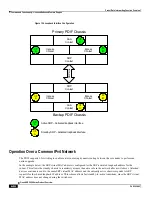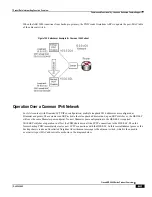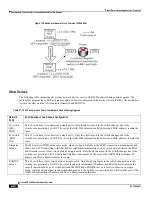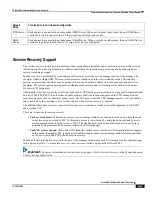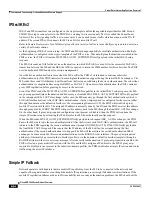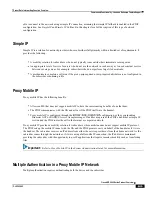
Packet Data Interworking Function Overview
▀ Features and Functionality - Base Software
▄ Cisco ASR 5000 Series Product Overview
OL-22938-02
There is no session dormancy in the PDIF. Once the session is active, the session never goes to a dormant state.
Important:
RADIUS attributes and customizable dictionary types are described in the
AAA Interface
Administration and Reference.
For the impact of attributes in Request and Reply messages, see also
Simple IP Call Minimum Requirements.
There is additional attribute information in the
Session Termination
section in
Troubleshooting.
Special RADIUS Attribute Handling
Certain attributes require special handling on the PDIF with the attribute values either controlled by a RADIUS
dictionary entry or a PDIF-service configurable. No configuration has no behavioral effect.
3GPP2-Serving-PCF. The generation of each new custom dictionary requires a new PDIF image. Configured in
the pdif-service mode, the command
<
>
specifies the required values for the attribute without building a new software image. If configured, this
attribute is sent in RADIUS accounting messages.
The following attributes are in custom dictionaries but have a customer-requested component.
Calling-Station-ID. Required for PDIF RADIUS messages, there is a ―dummy‖ value of 000000000000000
(fifteen zeros) set in this attribute. For non-PDIF product lines, the configured value may be taken only if no
attributes are received through the corresponding access protocols. Configurable in the PDIF-service.
NAS-Port-Type. The 3GPP2 X.P0028-200 standard requires this value to be set as ―5 (= Virtual).‖ Controlled
through the RADIUS dictionary.
Service-Type. Cisco specifies a Service Type of ―framed‖ for PDIF messages. Controlled through the RADIUS
dictionary.
Framed-Protocol. There is no attribute value defined for IPSec. Cisco specifies a value of ―PPP‖ for PDIF
messages. Controlled through the RADIUS dictionary.
BSID. Base Station ID is used in billing for calculating time-zone offsets. There is a dummy value set in this
attribute for RADIUS messages from the PDIF. Configured in the PDIF-service.
3GPP2-MEID and 3GPP2-ESN. Since the customer billing system expects these attributes, a null value is set in
these attributes for RADIUS messages from the PDIF. Mobile Equipment Identifier (MEID) uniquely
identifies the mobile equipment and is the future replacement for Electronic Serial Number (ESN) of the
Mobile Station. Controlled through the RADIUS dictionary.
3GPP2-Last-Activity. The event timestamp is set in this attribute where applicable in RADIUS messages from
PDIF. This attribute is the same as the 3GPP2-Last-User-Activity-Time standard attribute.
3GPP2-Service-Option. Set with a default value of 4095. Configurable in the PDIF-service.
SN-Disconnect-Reason.This is a Cisco VSA that specifies a more detailed reason for session disconnection.
3GPP2-Active-Time If required for billing purposes, this VSA could be populated with the session length by
generating a new RADIUS dictionary with this attribute. Unless specifically requested, a custom RADIUS
dictionary does not include the 3GPP2-Active-Time VSA.
Summary of Contents for ASR 5000 Series
Page 1: ......
Page 26: ......
Page 48: ...New In Release 10 0 SCM Features Cisco ASR 5000 Series Product Overview OL 22938 02 ...
Page 50: ......
Page 58: ......
Page 68: ......
Page 126: ......
Page 138: ......
Page 146: ......
Page 218: ......
Page 236: ......
Page 356: ......
Page 374: ......
Page 422: ......
Page 496: ......
Page 572: ......
Page 654: ......
Page 700: ......
Page 726: ......
Page 784: ......
Page 816: ......
Page 844: ......
Page 906: ......
Page 926: ......
Page 942: ......
Page 943: ...Cisco ASR 5000 Series Product Overview OL 22938 02 Chapter 30 Technical Specifications ...
Page 966: ......
Page 972: ......

